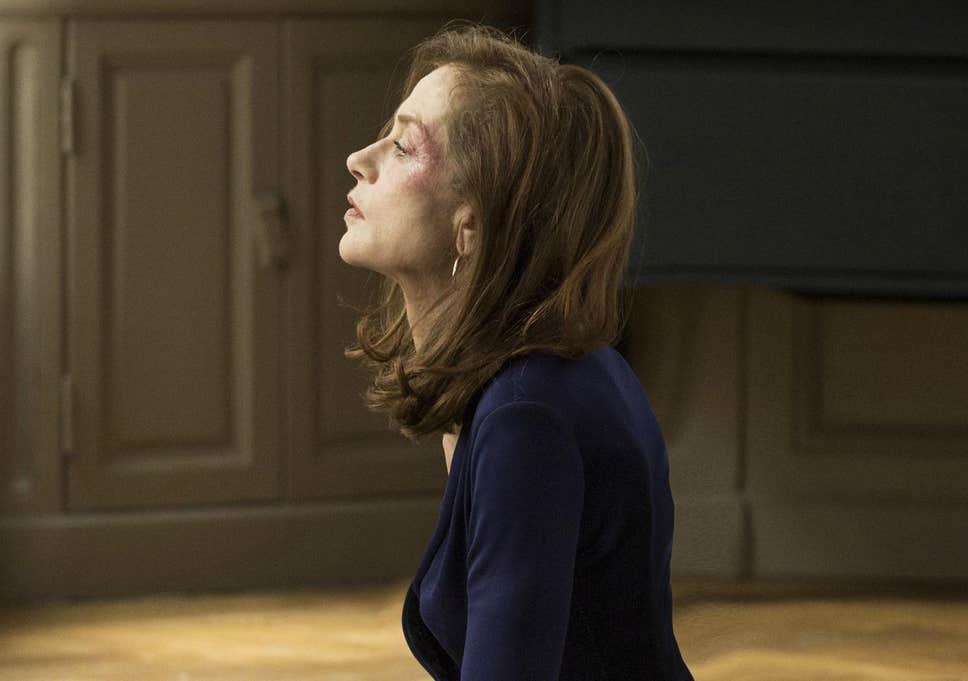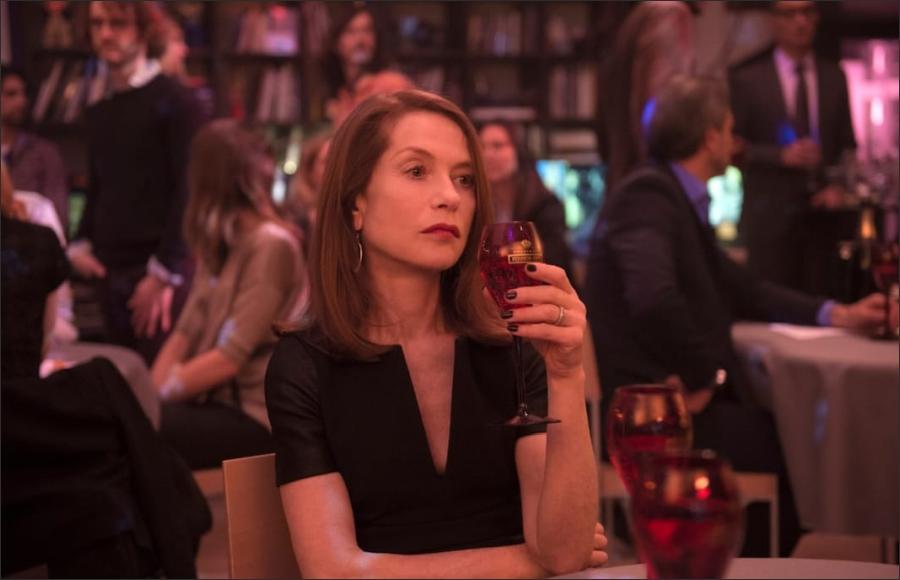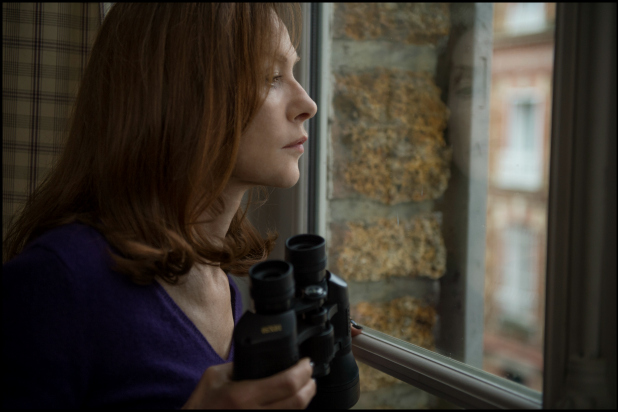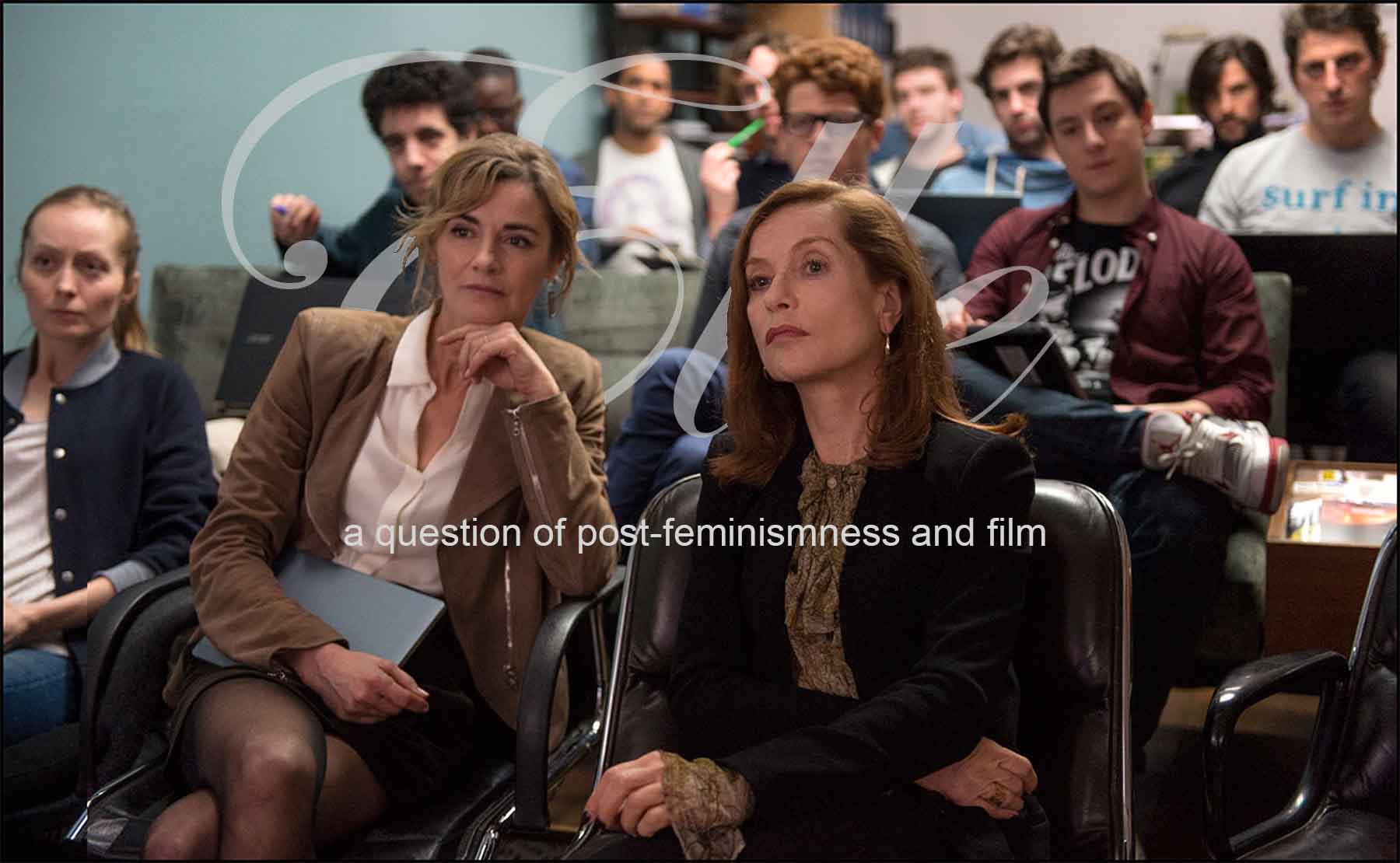I’m going to try something different here with this post, I am going to try and start an Elle Movie open conversation. Normally, the cadence of this blog is summed up as me giving you a non-spoiler overview of a movie. A trailer. And then a deep dive walkthrough of the movie for those that have seen it. Then maybe, depending on the movie, I’ll give you theories to give you different ways of possibly interpreting the movie. And then in the comments you guys tell me how stupid I am…and I how missed this or that, or you push a specific theory that you like. Right? That’s how it normally goes. But today, I am bringing an extraordinarily complicated and controversial movie to you. Jennifer brought it to us, and instead of me telling you how to think about it, I figured we could discuss it in the comments and come to an idea of what it might mean together. So, in a word, a discussion. I will do a high level walk through of the film and give thoughts on the radioactive portions of the film – so that people who don’t want to watch the movie can still participate. Because, to be honest, if I had known what I was walking into, I probably wouldn’t have watched it myself. The movie in question is the 2016 French film Elle by Paul Verhoeven (Basic Instinct and Robocop).
To be honest here, I am as much interested in the conversation about the conversation as I am interested in the conversation. The meta-conversation about this complicated topic, and the rules/morés about this taboo topic that just make this so difficult. But, heck, I’m willing to get the conversation going any direction it wants to go as well as it is interesting, thought provoking, and respectful. Fair enough?
Elle Movie High Level Walkthrough
The entirety of the setup for the French movie Elle is a contrivance. Michèle Leblanc’s history (played by Isabelle Huppert), her familial relationships, her job…all of it is a wickedly well designed Venus Fly Trap, all to lead us into one decidedly wickedly awful situation. And the discussion centering around this situation. And what might that be you ask? Oh dear, dear innocent reader. Give it a moment. Why should I tip you off? I didn’t have that luxury!
So as the movie opens, Michèle is raped. It’s horrible, obviously. He breaks into her house, beats her, and then flees the house after the deed is done. Now this is where things get weird. Michèle cleans up the mess, and then goes on about her life. She mentions it only to her friends over dinner, and that is basically it. Huh. What could all this possibly mean?
As the movie continues, everything in Michèle’s life is a question. Could it be one of the developers in her game development company that disdains her? A random guy? A neighbor? Michèle begins turning over every rock of the men in her circle as she attempts to figure this puzzle out.

Oh, and did I mention that Michèle’s father was convicted of killing numerous people along her street as a child? When the police found her father, Michèle was there, right in the middle of it all. Dead animals, dead children, dead neighbors. So one of the reasons Michèle chose not to go to the police was a desire to avoid the police and the renewed attention. (See Venus Fly Trap).
The rest of the movie is cleverly crafted contrivances designed to bring us to the realization that Patrick, Michèle’s neighbor, is her rapist. She learns after he rapes her again, and she stabs him in the hand, and then unmasks him. But after she learns of this truth, she doesn’t do anything specifically to protect herself. In fact, if anything, she opens herself up to attack through her carelessness. And now you know why this is such an extraordinarily sticky movie to talk about. That last sentence (“if anything she opens herself up to attack through her carelessness.”) could be seen as sexist and the standard hateful male view of rape. But, no really! This time, it’s literally true. Michèle ends up in a relationship with the rapist, and continues talking with Patrick in spite of her knowledge of the attack and her attacker.
After Patrick “rapes” her (with her consent – which he doesn’t want, and yet, she’s given – I’m so confused) a couple more times, I sort of lost count as I fast forwarded through the violence. But the last time, Vincent, Michèle’s son, walks in on what is happening, and bludgeons Patrick in the head. Patrick, as he is dying, looks confused by the recent turn of events. But Michèle remains as calm, collected, and composed as ever.
The True Carnage of Rape
1 in 6 women will be subjected to an attempted or completed rape in their lifetime. That statistic alone makes me shudder. If 49.5% of the population is female, and there are currently something like 8 billion people on the planet – that means that something like 673 million women have been raped, or subject to an attempt. Come on, this number is a travesty. I can’t even wrap my head around that number. It’s is just too blooming enormous.
So for us to have before us a movie (by a male screenplay writer David Birke, and a male director Paul Verhoeven, I might add) that discusses a woman that begins to engage with her rapist willingly…seems a trifle, how does one say, irresponsible. Yes, this movie was brought to us by the director of Robocop for the love of all. Robocop, for its day, was one of the most violent wide-release ever. And Basic Instinct, was one of the single most intentionally titillating movies ever. So my faith in Verhoeven as an altruistic purveyor of a legitimate character study is slim. Does that make sense? If he were wanting to tell the story of true trauma, and the toll it took on this woman that is now subject to a horrible case of Helsinki Syndrome, OK. But that isn’t what happened here. Yes, we learn of Michèle’s traumatic past. And yes, we know that she is obviously not 100% right in the head as a result. But to sloppily toss this story on that particular psychological pile seems lazy.

Titillation or Innovation?
Verhoeven first attempted to make this movie in the United States. But after running out of leads that could pull this crazy screenplay off, or even attempt it, he took his film to France. But by partaking in a movie like this, doesn’t it somehow minimize the effects of the pain of the women around the world that have been abused? I mean, just by choosing to be a foley artist, a rigger, anything, for this film, are you implicitly saying that there are times that rape is OK? Even if that is a risk, don’t you have to walk away from a film like this? Personally, my preferred movie about rape, by a female director, is You Were Never Really There. Joaquin Phoenix attacking rapists of under age girls with ball peen hammers has a nicer ring to it than a movie that sort of gives it a subtle nod in the ascent.
Yes, Isabelle Huppert’s acting in this role is fairly amazing. And yes, it’s complicated and nuanced. But what I am talking about here has nothing to do with the technical capabilities of this crew, or the movie making. It has everything to do with the realities of rape in this modern day and the enormous trauma caused to 680 million people on the planet. Plus or minus. It just seems that the director is more interested in movie sales, and titillation, than he is in engaging in a real conversation about the problems of rape in the 21st century.
Isabelle Huppert, in an interview during the New York Film Festival press screening, said, “It’s difficult for me to talk about ‘a story’ or ‘a character,’ it something that I thought has never existed before in fiction. This woman, you certainly don’t meet her walking in the subway. She’s a new type of a woman, and I thought that was exciting to bring life to her…She’s what I would call almost like a post-feminist character, building her own behavior and space. She doesn’t want to be a victim, that’s for sure, but she doesn’t even fall into the caricature of the revenge avenger. She’s somewhere else.”
And then, this is the portion of the interview I found most intriguing – her discussion of the indictment of the men implicit within the confines of this story: “She’s also the result of men’s failure. I think the movie is, you can call it a woman’s film, but you can also call it a man’s film by default,” she said. “All the male figures are failed or mediocre. The husband is a bad writer. The men’s figures are weak and sort of coming off from the pedestal. She is the protector of that maybe new era in a way.”
If there is a redemptive story within this movie it would be to discuss the moral failings of men today as a result of this gigantic pandemic against woman across the globe. And maybe it is as a result of men and their failures generally that we have gotten here. I am not perfect. For sure. But to accept this culture of rape coming from men today is just mind boggling to me. Currently, as I write this, Epstein has been indicted on charges of child trafficking and underage sex charges. Rape. Etc. His indictment is a great win, but how long did it take? His first time around this particular barn he was let off the hook by Acosta and given a sweetheart deal. Just unbelievable to me. So there is the crime of rape, and then there is the crimes committed after the fact that dehumanize these women (children) and belittle them into not speaking out. Both are outrageous. And that is sort of what I see happening in this story here, Michèle, worried about her past, refuses to mention the crimes against her. But then she willfully chooses to discuss this with Patrick. Engage with him in this, willingly. To say that this is post feminism, well, then I personally don’t want any part of this post feminism then.
And yet, everyone adores this movie. Critics, artists, the lot, all adore it. Here is the intro to the New York Times Magazine review of the film: “There are two unexpected orgasms in ‘Elle,’ the latest film by Paul Verhoeven, and both are achieved by Michèle, played by the French actress Isabelle Huppert as only Isabelle Huppert could play her. Michèle is a successful, no-nonsense video-game executive, daughter of a jailed serial-killer father and a sex-obsessed cougar mother, ex-wife of a failed writer, mother to a useless son and, above all, a woman who gains mastery over her rapist by finding her own pleasure in the horrifying act. If there is another actress working today who could have pulled off this role, who could have dignified, deepened and brought humor to it, I can’t think of whom it might be.” You can see the rest of their write up here, but it goes on to say that Michèle overcomes the horrible and idiotic men in her life in her own way. That her actions don’t glorify or justify rape. That it doesn’t hint that victims shouldn’t call the police. And they definitely shouldn’t invite their rapists over for dinner with her friends as happens with Michèle.
So maybe I’m missing the power of this woman, this character. Maybe I don’t fully grasp what this character is attempting to do.

Elle Movie Open Conversation
I really do want to hear what you guys thought of this movie. Make it more of a conversation. I’m sure there are a million ways to look at this movie. That she appropriated her pain, and refused to be subject to the horror forklifted onto her. That she was just as broken as he was, but in different ways. That she ultimately got him killed (Midsommar anyone? Gack.) and is she to blame for that? Or is that his own fault? But all of these questions just skirt around the larger problem that this movie has advertently, and quite intentionally, stepped into. Better yet, what is my role in all of this? Should I have dismissed this write up out of hand? Is the titillating topic now being used by me for page views and ad revenue. (I’ve turned off all the ads on this page that I can turn off…just so we are clear.) But it’s muddy, this topic. Start to finish, a muddy muddy conversation, and maybe that is where the best conversations start and end, is in the mud.
Edited by: CY


